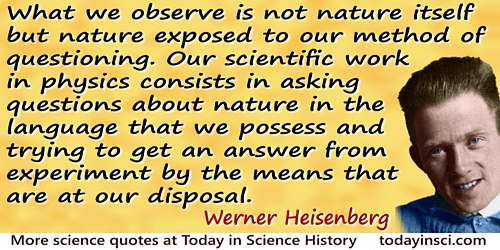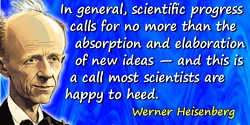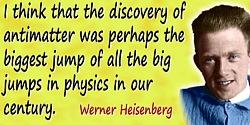 (source)
(source)
|
Werner Heisenberg
(5 Dec 1901 - 1 Feb 1976)
German physicist and philosopher remembered for his Uncertainty Principle (1927) and other developments in quantum mechanics. He was awarded the 1932 Nobel Prize for Physics.
|
Werner Heisenberg Quotes on Observation (4 quotes)
>> Click for 38 Science Quotes by Werner Heisenberg
>> Click for Werner Heisenberg Quotes on | Nature | Quantum Physics |
>> Click for 38 Science Quotes by Werner Heisenberg
>> Click for Werner Heisenberg Quotes on | Nature | Quantum Physics |
…separation of the observer from the phenomenon to be observed is no longer possible.
— Werner Heisenberg
Quoted in Robert J. Scully, The Demon and the Quantum (2007), 3.
It seems sensible to discard all hope of observing hitherto unobservable quantities, such as the position and period of the electron... Instead it seems more reasonable to try to establish a theoretical quantum mechanics, analogous to classical mechanics, but in which only relations between observable quantities occur.
— Werner Heisenberg
In Helge Kragh, Quantum Generations: A History of Physics in the Twentieth Century (1999), 161.
Since the measuring device has been constructed by the observer … we have to remember that what we observe is not nature itself but nature exposed to our method of questioning. Our scientific work in physics consists in asking questions about nature in the language that we possess and trying to get an answer from experiment by the means that are at our disposal.
— Werner Heisenberg
Physics and Philosophy: The Revolution in Modern Science (1958), 78.
Thus one becomes entangled in contradictions if one speaks of the probable position of the electron without considering the experiment used to determine it ... It must also be emphasized that the statistical character of the relation depends on the fact that the influence of the measuring device is treated in a different manner than the interaction of the various parts of the system on one another. This last interaction also causes changes in the direction of the vector representing the system in the Hilbert space, but these are completely determined. If one were to treat the measuring device as a part of the system—which would necessitate an extension of the Hilbert space—then the changes considered above as indeterminate would appear determinate. But no use could be made of this determinateness unless our observation of the measuring device were free of indeterminateness. For these observations, however, the same considerations are valid as those given above, and we should be forced, for example, to include our own eyes as part of the system, and so on. The chain of cause and effect could be quantitatively verified only if the whole universe were considered as a single system—but then physics has vanished, and only a mathematical scheme remains. The partition of the world into observing and observed system prevents a sharp formulation of the law of cause and effect. (The observing system need not always be a human being; it may also be an inanimate apparatus, such as a photographic plate.)
— Werner Heisenberg
The Physical Principles of the Quantum Theory, trans. Carl Eckart and Frank C. Hoyt (1949), 58.
See also:




 In science it often happens that scientists say, 'You know that's a really good argument; my position is mistaken,' and then they would actually change their minds and you never hear that old view from them again. They really do it. It doesn't happen as often as it should, because scientists are human and change is sometimes painful. But it happens every day. I cannot recall the last time something like that happened in politics or religion.
(1987) --
In science it often happens that scientists say, 'You know that's a really good argument; my position is mistaken,' and then they would actually change their minds and you never hear that old view from them again. They really do it. It doesn't happen as often as it should, because scientists are human and change is sometimes painful. But it happens every day. I cannot recall the last time something like that happened in politics or religion.
(1987) -- 


